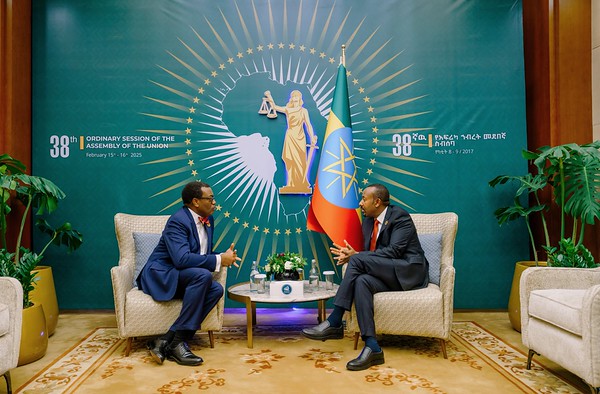
Dr. Akinwumi A. Adesina, President of the African Development Bank Group (AfDB), delivered a powerful farewell address to African Heads of State and Government at the 38th African Union Summit, marking the culmination of a decade of impactful leadership. The summit, held in Addis Ababa from February 15-16, 2025, served as a platform to celebrate the Bank’s remarkable achievements in driving Africa’s economic transformation and endorse key initiatives poised to shape the continent’s future.
Adesina, whose tenure as AfDB President concludes on September 1, 2025, leaves behind a legacy defined by the Bank’s transformative High 5s Agenda – Light up and Power Africa, Feed Africa, Industrialize Africa, Integrate Africa, and Improve the Quality of Life for the People of Africa. This agenda has demonstrably impacted the lives of over half a billion Africans, fostering progress across critical sectors.
“It has been an unprecedented partnership to advance the goal of the African Union towards achieving Agenda 2063: the Africa we want,” Adesina declared, reflecting on the collaborative spirit that has defined his leadership. He highlighted the Bank’s transformation of 515 million lives, including 231 million women, through initiatives that have improved access to healthcare, clean water, sanitation, ICT services, and electricity.
A landmark achievement during Adesina’s tenure was the Africa Energy Summit in Tanzania, where 48 nations adopted the Dar es Salaam Declaration, committing to a joint effort with the World Bank and AfDB to connect 300 million Africans to electricity by 2030. This ambitious goal received a significant boost with $48 billion in commitments from the two institutions and an additional $7 billion from other development partners. The AU Summit formally endorsed this declaration, alongside other crucial initiatives such as the Baku Declaration on Measuring Africa’s Green Wealth and the African Financing Stability Mechanism, a $20 billion facility designed to provide a financial buffer for African nations. The summit also adopted the Strategic Framework on Key Actions to Achieve Inclusive Growth and Sustainable Development in Africa, a roadmap for achieving sustained economic growth across the continent.
Adesina also emphasized the Bank’s significant contributions to food security, citing initiatives like TAAT, the Dakar 2 Food Summit, and the Africa Emergency Food Production Facility. These efforts have demonstrably improved food security for over 101 million people, with Ethiopia’s remarkable achievement of wheat self-sufficiency and export status serving as a prime example of the Bank’s impact.
Job creation and youth empowerment have been central themes of Adesina’s leadership. The Bank has trained 1.7 million youth in digital skills and is rolling out Youth Entrepreneurship Investment Banks to foster youth-led economic growth. The Affirmative Finance Action for Women in Africa (AFAWA) initiative has further empowered women-owned businesses, providing $2.5 billion in financing to over 24,000 enterprises.
Under Adesina’s guidance, the AfDB has become the largest multilateral financier of African infrastructure, investing over $55 billion in the sector. Healthcare has also been a priority, with $3 billion committed to quality healthcare infrastructure and another $3 billion allocated for pharmaceutical development, including the establishment of the Africa Pharmaceutical Technology Foundation.
Adesina’s decade of leadership has been marked by historic financial mobilization for Africa. The Bank’s capital has increased significantly, and the African Development Fund secured a record $8.9 billion replenishment. The Africa Investment Forum has further mobilized over $200 billion in investment commitments, solidifying Africa’s position as an attractive investment destination.
In his farewell address, Adesina expressed deep gratitude to African leaders, the AU Commission, regional economic communities, and the people of Africa for their unwavering support. He emphasized the strong partnerships forged and the global alliances established to advance the continent’s interests.
The 38th AU Summit, themed “Justice for Africans and People of African Descent Through Reparations,” brought together global leaders, including UN Secretary-General António Guterres and Prime Minister of Barbados Mia Mottley. Guterres reiterated his call for reform of the international financial architecture, highlighting the challenges faced by African economies due to debt burdens and high borrowing costs. Mottley emphasized Africa’s strategic importance in the global economy, particularly its control of vital minerals, and urged African nations to proactively engage with emerging technologies like artificial intelligence. She also called for greater integration between Africa and the Caribbean and echoed demands for reparatory justice.
The summit concluded with a call for continued unity and resilience in addressing the continent’s challenges, as articulated by Ethiopian Prime Minister Abiy Ahmed. Adesina’s legacy at the AfDB stands as a testament to the power of visionary leadership and strategic partnerships in driving Africa’s transformation and empowering its people.
